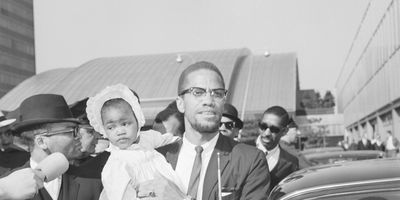Culture & Entertainment
Today is Malcolm X’s birthday. As an icon of Black liberation movements, his words are often rallying cries and guideposts in struggle. In 2020, after the officers who executed Breonna Taylor were not charged with her murder, my timeline was flooded with people reposting Malcolm’s famous quote: “The most disrespected person in America is the Black woman. The most unprotected person in America is the Black woman. The most neglected person in America is the Black woman.”
It was certainly an apt quote to use for the tragic situation surrounding the life and death of Taylor. Quickly, however, a cynicism began to take hold of me as I saw people with questionable politics around Black women repost Malcolm’s words.
Malcolm delivered those words to a congregation of Black people in Los Angeles, California just days after his birthday on May 22, 1965. Using his signature authoritative oratorical skills, he declared the harm that this world has caused Black women. In this same speech, he would go on to say: “Who taught you to hate the color of your skin? Who taught you to hate the texture of your hair? Who taught you to hate the shape of your nose and the shape of your lips? Who taught you to hate yourself from the top of your head to the soles of your feet?" Hating and harming Black women is akin to hating and harming yourself.
For Malcolm, to protect Black women, to respect and love Black women was not a hypothetical position to take. Just a few years prior to giving that speech, Malcolm severed ties with his mentor Elijah Muhammad after allegations against the Nation of Islam leader of having affairs with underaged girls were revealed, an allegation that Malcolm didn’t initially want to believe until speaking directly with one of the accusers himself.
He showed us that to show up for Black women means holding the abusers within your community accountable — even the ones you admire. It means listening to Black women but also taking principled action in response to what you’ve heard–even at the risk of your relationships and even your life.
The name and legacy of Malcolm X conjure strong feelings in many people. To some people, Malcolm was a militant hellbent on stirring racial unrest. To others, he was a messianic figure, who sacrificed himself for the good of the people. But this is how I choose to remember him: as someone whose love for Black women anchored his life. To honor Malcolm means to honor Black women, today, tomorrow, and always.
Featured image by Getty Images
ALSO ON XONECOLE
